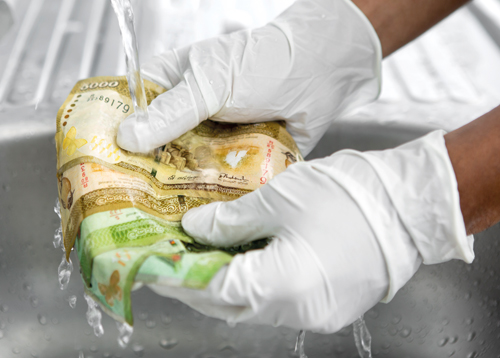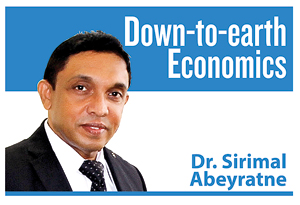Grease for rusty machines
View(s):
File picture of currency notes being washed. Sri Lanka is plagued by corruption and money laundering allegations.
A few weeks ago, 5.5 million people of Finland were rocked by shocking news. It was about a corruption allegation against Finland’s Prime Minister Sanna Marin. She had become the head of the state just one and half years ago. As at present, 35-year old Ms. Marin also holds the record of being the youngest head of state in the world.
As revealed in local media, Ms. Marin has been using ‘public money’ for subsidised breakfasts at her official residence. And it was 10 euros a day! After the news broke out in Finland, it hit the headlines of international media as well.
Many of us living in a different part of the world might question – “so, what’s the big deal?” When converted to US dollars a day, it would amount to about 12 US dollars, whereas an average cost of a breakfast in that part of the world could be just double that amount!
Well, here is the big deal; people living in Finland don’t know much about “corruption” in their world. Even an unaccounted penny from taxpayers’ money is something hard to believe for such nations which value the transparency and accountability of public finance management. It was precisely for this reason that the alleged corruption claims against the Prime Minister became shocking news.
A moral matter
After the alleged corruption news, the Police and the tax officers of Finland started an investigation. The Prime Minister herself was quick enough to make a correction, saying that “as Prime Minister, I have not asked for this benefit nor been involved in deciding on it…”. Nevertheless, because it has been now open
to questions, she pledged to pay back the total claim so far amounting to 14,000 euros. She further asked whether there are any taxes added to it that she should pay to the government.
The corruption issue related to the Prime Minister’s breakfast was, however, more a moral issue than a legal matter, as I learnt. It has something to do with a decision that the Finnish Parliament made in the 1950s!
The decades of the 1930s and 1940s were not good times for the western world. With no time to recover from the Great Depression in the 1930s, they all were caught up in the Second World War. In addition, Finland alone was at war with Russia or rather the USSR as it was called at the time; this conflict came to an end only after signing a peace accord in 1947.
Entangled with all these affairs, the then Prime Minister of Finland who also held some other important ministerial portfolio had to work hard for the reconstruction and development of the Finnish economy which was still an agrarian economy.
As he used to start his work in the office early morning even before dawn, the Finnish Parliament decided to offer him breakfast and, there it was – a paid breakfast at home. The tradition has continued over the years and decades so that it is true that Prime Minister Marin who was elected to the office only in December 2019, didn’t ask for it and neither she decided on it. However, as the circumstances had changed now, the need for a breakfast financed by public money as such has also changed over the past 70 years. This is the reason why the matter appears to be a moral issue!
Fruits of the value system
A legal issue can be sorted out legally, perhaps even at its highest level, the court. But moral matters are much more complex and deeper than that because they are rooted in the value system of a society. And more importantly there are fruits of such value systems, while the people living in such societies can enjoy those fruits.
The five Nordic countries – Finland, Denmark, Sweden, Norway, and Iceland – are well-known to be some of the “least-corrupted” nations in the world. It was precisely because of this value system that even the Prime Minister’s breakfast subsidy aroused such a big chaos in the country and in the world.
 According to the Corruption Perception Index of 2020, four Nordic countries are among the top-10 least corrupted nations: They are Denmark (1), Finland (3), Sweden (3), and Norway (7), while other countries in this group that are outside the Nordic region are New Zealand (1), Singapore (3), Switzerland (3), Netherlands (8), Germany (9), and Luxembourg (9).
According to the Corruption Perception Index of 2020, four Nordic countries are among the top-10 least corrupted nations: They are Denmark (1), Finland (3), Sweden (3), and Norway (7), while other countries in this group that are outside the Nordic region are New Zealand (1), Singapore (3), Switzerland (3), Netherlands (8), Germany (9), and Luxembourg (9).
The Corruption Perception Index is measured using a score on perceived levels of public sector corruption, according to experts and business-people. Corruption of the governments is not necessarily the bribery and commissions in them; it is the “abuse of entrusted power” in whichever way for private gain.
Most nations corrupted
In fact, the world is more corrupted than it appears to be; according to Corruption Perception Index 2020, two-thirds of the 180 countries in the world scored less than 50 percent on corruption. This means that their performance of being “less-corrupted” is less than satisfactory! Further, the report records that although a fewer number of countries have attempted to reduce corruption, “most countries still fail to tackle corruption effectively”.
Nearly half of the countries in the world have been stagnant on the level of their corruption status for the past 10 years, as the report shows. This indicates that these countries have failed to take any significant move forward in combating corruption.
One of the coherent explanations underlying the lethargic attitude of the governments towards combating corruption is that, if any government decides to fight against corruption, then it is going to be a “fight at home itself” rather than outside. A government cannot fight corruption at lower level without first fighting it at top level.
As the Corruption Perception Index report emphasises, in the countries where corruption is high, the functioning of anti-corruption authorities and institutions are paralysed, either deliberately or effectively. These authorities and institutions continue to suffer from lack of funds, infrastructure, resources, knowledge and skills, and independence preventing their efficient functioning.
Corruption and happiness
It is a hard truth and, perhaps, a natural law that the “least-corrupted” nations are also the “happiest” nations in the world! All of the Nordic countries are among the top-10 happiest countries in the world, according to World Happiness Index 2020: Finland (1), Iceland (2) Denmark (3), Sweden (6) and Norway (8). And the rest of the group also include the “least corrupted” Switzerland (4), Netherlands (5), Germany (7) and New Zealand (9).
Happiness Index of a country depends on the country’s quantitative indicator of GDP per capita and a set of qualitative indicators namely, social support, healthy life expectancy, freedom to make life choices, generosity and perception of corruption. Therefore, corruption is bad not just because of its ugliness and shamelessness; a whole nation must suffer from corruption of those who are entrusted with powers and responsibilities for the nation.
Countries with corruption have a typical problem of eroding public trust in the government and the personalities who run the government machinery. In effect, democracies become weaker hampering their decision-making power of the governments. Moreover, unattended corruption weakens economic development and exacerbates inequality, poverty, and social division. It may also lead to environmental crises.
Corruption hates reforms
Economic studies find that corruption, and economic and public sector reforms do not go together. In other words, you typically find more corruption in the countries where there is lack of economic and public sector reforms. This means that reforms are necessary to fight corruption.
In countries where there are too many regulations and bureaucratic red tapes, there is also a high level of corruption. As a result, studies show that usually in countries with higher levels of corruption, people and businessmen need to visit politicians and bureaucrats quite often and spend more time hanging around them to get their work done.
Some economists view corruption like “greasing rusty state machinery” which would otherwise not run smoothly. But the problem is that grease would loosen many other things which needs to be tightened.
(The writer is a Professor of Economics at the University of Colombo and can be reached at
sirimal@econ.cmb.ac.lk and follow on Twitter @SirimalAshoka).


